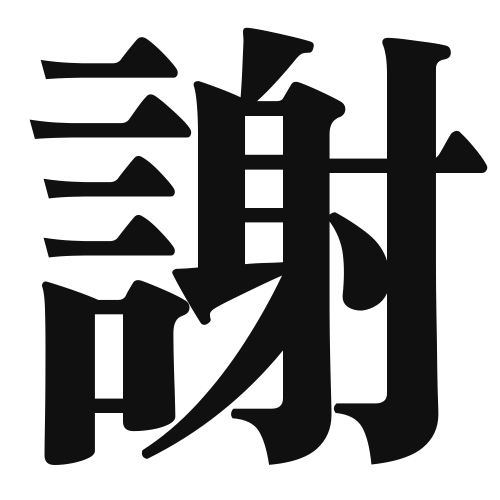1. Overview of Meaning
The kanji “謝” (sha) primarily means “to thank” or “to apologize.” It conveys a sense of gratitude or an expression of regret, depending on the context in which it is used.
2. Formation and Radical
Formation of the Kanji: The kanji “謝” is a compound character, which means it is formed by combining different elements. It is classified as a 会意文字 (ideogram), where the components represent the idea of expressing thanks or apologies.
Radical: The radical of “謝” is “言” (gen), which means “word” or “speech.” This indicates that the kanji is related to communication, particularly in expressing feelings or sentiments.
3. Examples of Usage
Common Words and Phrases: Some frequently used words that include “謝” are:
- 謝罪 (shazai) – apology
- 感謝 (kansha) – gratitude
Example Sentences in Daily Conversation:
- 彼に謝らなければならない。 (Kare ni ayamaranakereba naranai.) – I must apologize to him.
- 彼女に感謝の気持ちを伝えたい。 (Kanojo ni kansha no kimochi o tsutaetai.) – I want to express my gratitude to her.
4. Synonyms and Antonyms
Similar Kanji: A kanji with a similar meaning is “感” (kan), which means “feeling” or “emotion.” While “謝” focuses on expressing thanks or apologies, “感” is more about the feelings themselves.
Opposite Kanji: An antonym of “謝” is “無礼” (burei), which means “rudeness” or “impoliteness.” This represents a lack of gratitude or respect, contrasting with the meaning of “謝.”
5. Cultural and Historical Background
Relation to Japanese Culture: In Japanese culture, expressing gratitude and making apologies are considered essential social skills. The kanji “謝” reflects the importance of these values in maintaining harmony and respect in relationships.
Proverbs and Idioms: One common saying is “謝るは一時の恥、謝らぬは一生の恥” (Ayamaru wa ittoki no haji, ayamaranai wa isshou no haji), which translates to “To apologize is a moment’s shame; to not apologize is a lifetime’s shame.” This emphasizes the significance of acknowledging one’s mistakes and expressing gratitude.
